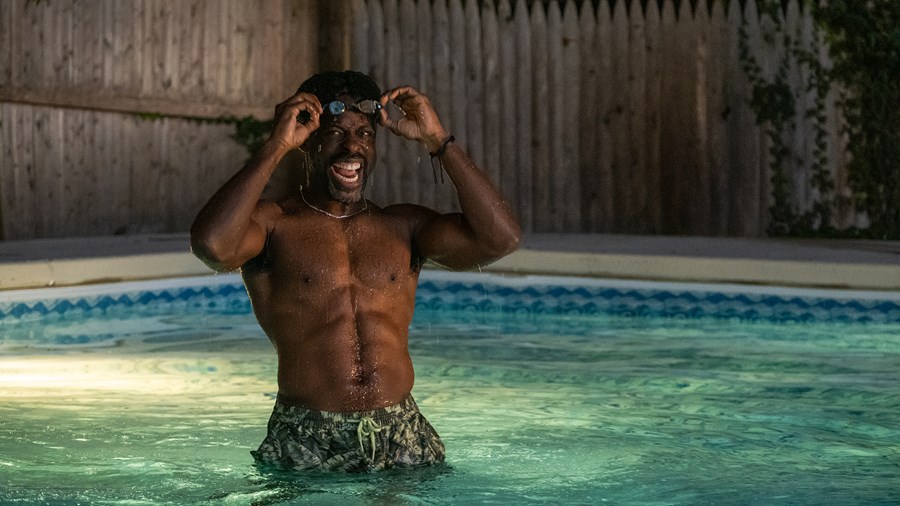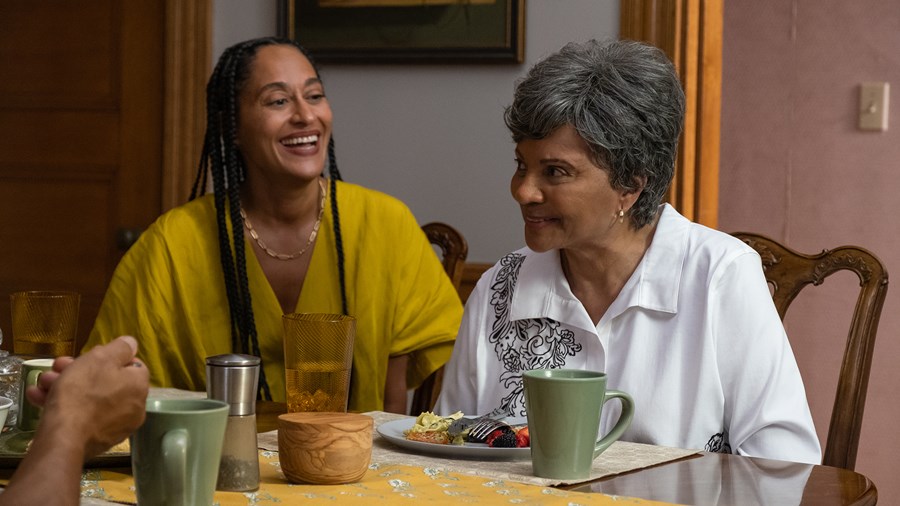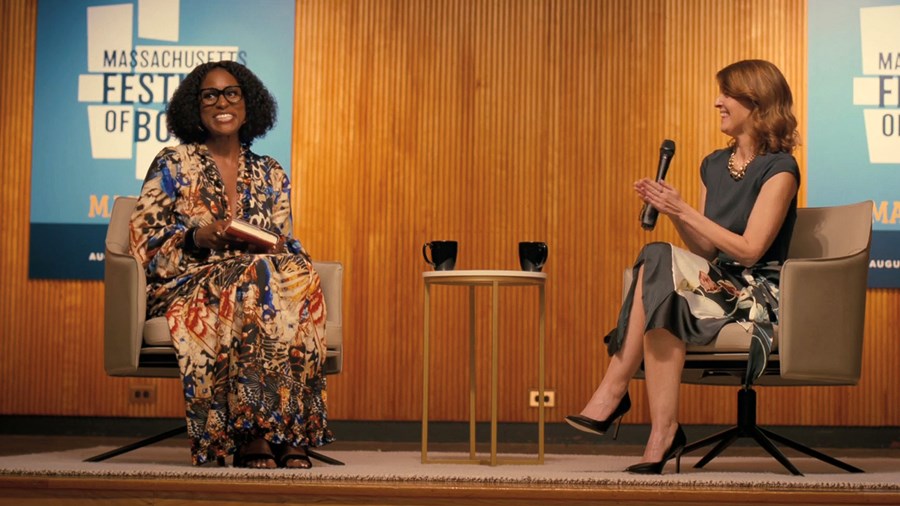Debut filmmaker Cord Jefferson speaks to Rōgan Graham about his envelope-pushing, Oscar-winning drama American Fiction, a biting satire of the publishing industry that explores the limits of the white imagination and the confinement of Black storytelling. The story, which Jefferson adapted from Percival Everett’s 2001 novel Erasure, centres on Monk (Jeffrey Wright), a disgruntled writer who invents a stereotyped alter ego to better sell books.

RŌGAN GRAHAM: WHAT IS YOUR RELATIONSHIP TO ERASURE?
CORD JEFFERSON: I discovered Erasure in December 2020. It felt like a gift written specifically for me. It featured all these conversations about race, what it means to be a Black creative, and the expectations that people put on you and your art. These issues were obviously pertinent to me – I’d been discussing them for decades. The book had all these strange overlaps with my personal life, not just the professional satirical stuff. About 20 pages in, I knew that I wanted to write the screenplay; by about 50 pages, I knew that I wanted to direct the film. Very early in the novel, I even started reading the character of Monk in Jeffrey Wright’s voice. I met Percival in early 2021 and he very graciously gave me the rights for free.

American Fiction (2023)
RG: THE BOOK IS OVER 20 YEARS OLD, DID YOU HAVE TO MAKE ANY UPDATES TO THE SATIRE?
CJ: [Laughs] No, no, no. This is, unfortunately, all too relevant today. I was a journalist before I started working in film and TV. One of the things that bugged me towards the end of my journalism career was that people had started to come to me saying, ‘Trayvon Martin has been killed, do you want to write about what happened?’ ‘This person has said something racist about President Obama, why don’t you write about that?’ It began to feel like all I had to offer was this revolving door of Black misery and tragedy.
I was excited to start working in film and TV because I thought I could write about anything, that the world was open to me. But there, people came to me and asked, ‘Do you want to write about slaves?’ The offers were movies about slavery, movies about civil-rights activists who overcome racism… I’m not saying that these movies shouldn’t exist, especially in America where people are actively trying to rewrite the history of slavery. In these times, those movies are more important than ever.
The bigger question is, why are we making only these movies to the omission of all these other stories we could be telling about Black people? Why is there such a poverty of imagination? So, for me, Erasure was sadly all too relevant.

American Fiction (2023)
RG: WAS THERE ANY RESISTANCE TO GETTING THE FILM MADE BECAUSE IT’S SO CRITICAL OF THE ESTABLISHMENT?
CJ: Here's the thing, the film was both easy to make and hard to make. I read the book in December 2020. The film opened in US cinemas in December 2023. I’ve had numerous people tell me that it’s the fastest they’ve ever seen a movie come together.
T Street was the only production company to greenlight the movie in the room. I started crying when they said that, because I was at a point in my career when I thought I was never going to get anything of my own made.
Then we shopped it around to a bunch of distributors. I cannot tell you the number of times I heard people say, ‘I wish I worked at a place that could make this movie.’ It was cheap to make – it’s not like there’s a bunch of CGI or action sequences. These people had the money, they had the resources, they just didn’t have the will to make it. They were afraid of the material, I think. This industry is very risk-averse these days. So it was easy to get made when I found people with the courage to do it.

American Fiction (2023)
RG: HOW DID YOU ASSEMBLE THIS CAST, WHICH IS FULL OF BELOVED BLACK ACTORS BEST KNOWN FOR THEIR TELEVISION WORK?
CJ: I wanted Jeffrey right away because of the nature of the character. Monk is prickly, isolated and alienating, so I knew that he needed excellent foils to portray his siblings who could elicit laughter and cause him to drop his guard. For Tracee [Ellis Ross] and Sterling [K Brown], I watched interviews they did on late-night shows, and found that their natural effervescence was exactly what those characters needed. The same goes for Erika Alexander [who plays Monk’s love interest Coraline]. Her show Living Single was a big part of my childhood. She has a charm that I thought would work well against Monk’s more demure demeanour.
I really wanted to show these actors in roles that you wouldn’t expect. People think of Tracee Ellis Ross on sitcoms, and Sterling K Brown as the very strait-laced This Is Us guy. I put them in roles that played to their strengths, but also gave them an opportunity to flex new muscles. Sterling is playing a drug-addled party boy in American Fiction. You’re so used to seeing him as a very put-together fatherly figure, and all of a sudden he’s going through a midlife crisis, trying to figure out where he fits in in the world. These are opportunities that these actors don’t necessarily get all the time.

American Fiction (2023)
RG: THERE'S A SCENE BETWEEN ISSA RAE'S CHARACTER SINTARA AND MONK WHERE THEY DISCUSS BLACK LITERATURE. IT HIGHLIGHTS THAT FINE LINE BETWEEN CHALLENGING THE WHITE GAZE AND OUR OWN RESPECTABILITY POLITICS.
CJ: When I was reading Erasure, I was very excited for the scene in which Monk and Sintara meet, and then it never came. So when I sat down to write the script, I knew I was going to have to include one.
Jeffrey and I didn’t want the film to be some ‘talented tenth’. It was this concept [sociologist and civil-rights activist] WEB Dubois wrote about in the 1920s that 10% of Black people are going to have to lift the other 90% out of the gutter. This enlightened 10% is going to bring the other 90% into the light and help them see the righteous path. When Jeffrey and I sat down, the first thing he said was ‘I want to make sure that we’re not making a film that feels like it’s like scolding Black people, or policing Blackness’.
And that, to me, is why that scene is so important. I like the rug pull of people thinking, [populist writer] Sintara is the villain and Jeffrey’s Monk is the righteous one, but then he starts to agree with her. In that conversation, when she confronts him with this idea that maybe he’s a little self-loathing, he’s caught on his heels. For me, it’s a linchpin scene. Without it, the movie is far less effective. The thing I love about it is that I wrote the damn thing, and I don’t know who I agree with.
I’ve had people ask me, ‘What do you hope people take away from the movie?’ and I don't want to spoon-feed morality. What I wanted to do with this film was just present a series of characters, a series of scenes with some ideas, and then allow people to make their own conclusions about things.

American Fiction (2023)
RG: IT’S INTERESTING THAT MONK, IN HIS SNOBBERY, LOOKS DOWN ON SINTARA’S BOOK, BUT ALSO BROKEN FAMILIES, EVEN THOUGH HIS OWN FAMILY ISN’T ALL THAT DIFFERENT.
CJ: That’s the sleight of hand of the film. This is a movie in which one of the characters is deeply upset by, as he says, the way certain stories flatten our lives, as if we are not dynamic, complex, nuanced and varied.
Monk says, ‘We never see complex Black life’, but that doesn’t mean there’s a lack of tragedy in his own life. This movie is full of traumatic moments. I don’t think Black movies need to be joyous. I don’t think the Black movies need to be anything. Make whatever art you want! That’s what Monk starts to understand. And that scene we were just talking about with Sintara shows that directing your ire at other artists is missing the point. What you should be doing is looking at the people 10 levels above these artists, who are the ones making the business decisions. It’s far more reasonable to question the systems in which people operate. Why do people do the things they do? Because we’re all stuck within an infrastructure that was built long before we were here.
WATCH AMERICAN FICTION IN CINEMAS




